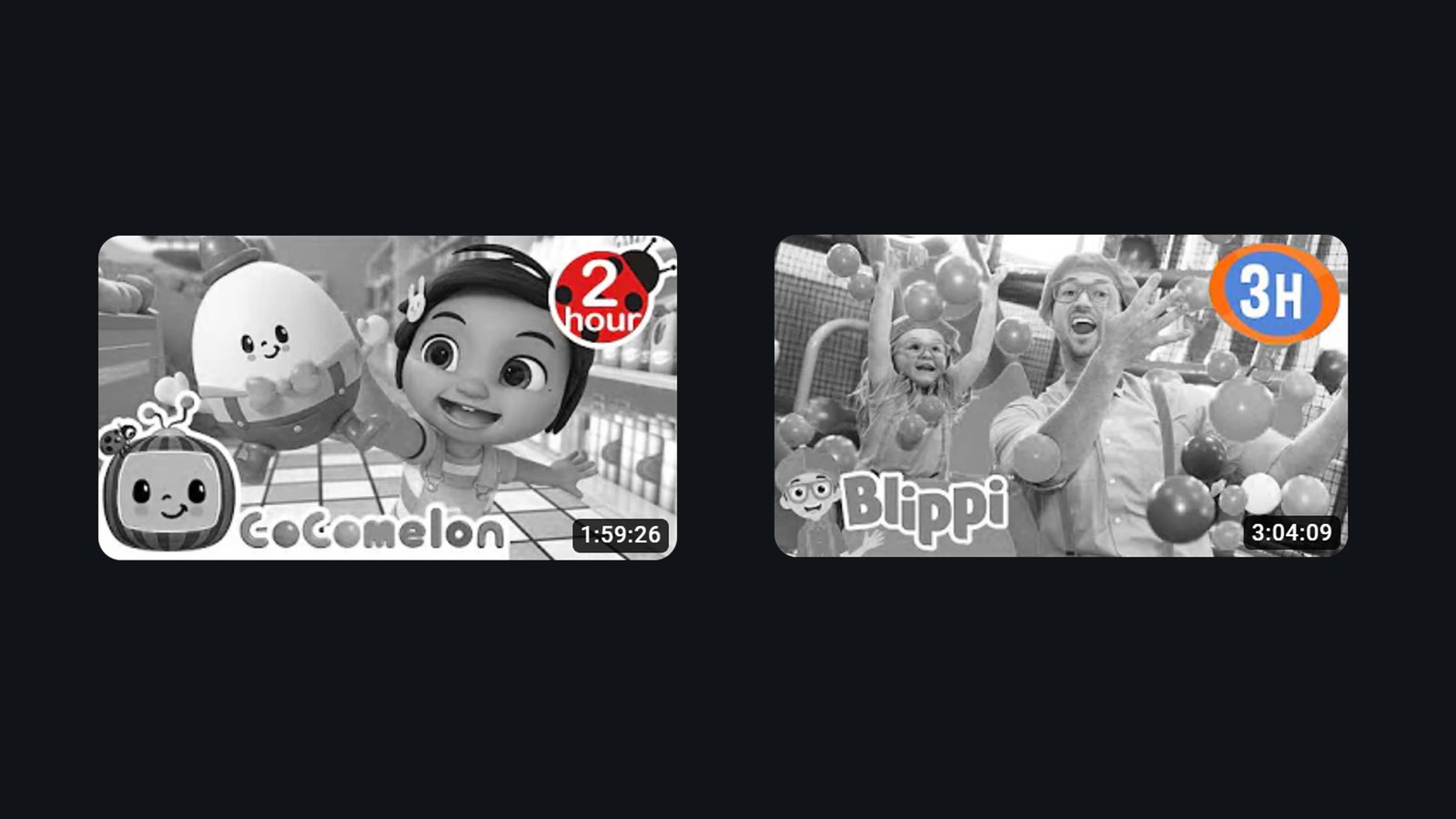

How Kids' Channels Manipulate Parents
(Read on Twitter)
Besides talking about attention all day, I'm also a father.
There's a subtle yet extremely predatory practice that has been emerging from kids' channels on YouTube for quite some time now. Directly aimed toward parents and particularly sneaky:
Social Peace Signaling
It's basically when the length of a video for kids is explicitly signaled in the thumbnails.


Implicitly suggesting:
"We'll take care of your kids' attention, you will have social peace for this X amount of time."
You probably can't grasp how problematic this is if you're not a full-time parent. But if you are, you know exactly what I'm talking about.
You see, as someone who spends a lot of time on attention strategy, I witness things occurring behind the curtains that 99.9% of the population don't. Namely how cannibalizing the creator industry is to retain attention (using various optimization tactics). Don't get me wrong, I'm also guilty of it (I literally teach this), but kids are my limit.
Make no mistake, what appears as harmless colorful animations and cheerful music is actually underpinned by sophisticated retention levers. They use studies developed by behavioral psychologists who specialize in understanding and influencing children's behavior patterns.
Their goal is clear: keep children glued to their screen for as long as possible, leveraging insights into children's natural curiosity and developing attention spans.
I want you to understand that this is the pornographic equivalent of parenting; many parents are overwhelmed by life, exhausted from long workdays, and for some of them, it can be very hard not to give in to temptation. I see this all the time, everywhere.
The negative impact of children's overexposure to screens is well-known and no longer needs proving. Yet, these channels are exploiting the weakness (or worse, ignorance) of these overwhelmed parents (or neglecting ones, they don't all have an excuse.)
Usually, low-ethical channels use these kinds of filthy strategies in the "regular content world".
Not only is it a common practice in the kids' market on YouTube, but it is also the case among industry heavyweights.


You're probably not aware of it but, the kid market is way, waaaaay bigger than any market on YouTube, by very far.
To give you an idea and a bit of contrast, even MrBeast is a tiny fish compared to the kid's channel whales (in terms of attention spent.)


In case you have no marketing background, know that the financial benefits are too good to be dismissed and go far beyond just milking AdSense and product placements on YouTube.
There's a metric most big companies look at very closely called Customer Lifetime Value (the total revenue a company expects to earn from a customer over the course of their lifetime) and entering children's brains at a young age (before they build mental defenses and critical thinking) is profitable beyond what most humans can fathom:
- Birthdays
- Christmas
- Everyday gifts
- Video games
- Movies
- Pencil cases - Schoolbags
- Duvets
- Pillows
- ...
You name it. Hundreds, if not thousands of everyday branded items are at stake.
We're talking about an industry that is often cited as exceeding the trillion-dollar mark globally ($1,000,000,000,000).
In case you didn't know, McDonald's became McDonald's mainly because of the Happy Meal.
It's a multi-generational strategy to hook kids who visit McDonald's when young (enticed by the allure of a cheap plastic toy in fancy packaging), so they get accustomed to it and continue visiting throughout their lives, until they become parents and repeat the cycle with their own kids (a never-ending Customer Lifetime Value if you will).
There are currently no regulations (and there probably won't be any anytime soon until dramatic consequences occur), that's why this post is mainly here to serve as a PSA.
I encourage you to share it with your friends & family who have young kids so they can protect them and be aware of this.
Since banning screens completely isn't a good solution either in my opinion, my actionable advice (that's what I personally do) is:
- Phones/tablets banned (preventing children from controlling what they watch)
- TV usage is strictly limited to a small fraction of the day (I keep the remote under my control)
- Only pre-2006 cartoons that I watched as a kid before the retention optimization era (that I know are "hyper-retention proof")
This is just a post from a concerned father working in the attention industry to other fellow parents: take care of your children, or these channels will.
Home